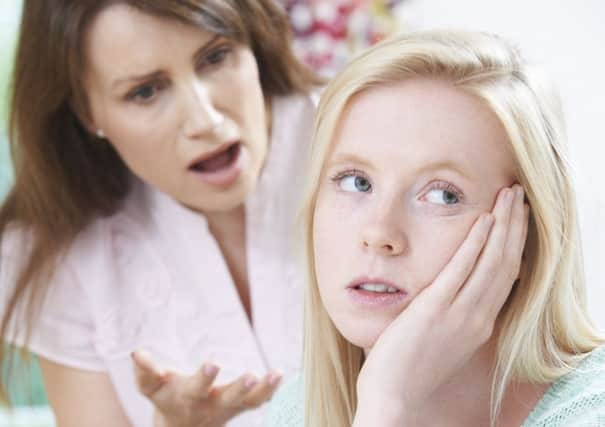Worry about anxiety not alcohol, girls tell parents


Young girls said mental health, cyber-bullying and jobs were the biggest worries in their lives, and an increasing number considered self-harm and depression as the most significant health issues facing their peers, above drug or alcohol abuse.
Sarah Brennan, chief executive of mental health charity YoungMinds, said the findings of Girlguiding’s Girls’ Attitude Survey 2015 were a “wake-up call” and highlighted the “mental anguish so many girls face every day”.
Advertisement
Hide AdAdvertisement
Hide AdAccording to the survey, 58 per cent of girls aged 13 to 21 believed mental health was a serious concern, 37 per cent said they were worried about cyber-bullying, and 36 per cent said they fretted about not being able to get a job.
But they felt misunderstood by adults, saying their parents worried more about drug and alcohol use than mental illness.
Forty-two per cent said their parents were concerned about drug use, 33 per cent said they worried about alcohol, and 29 per cent highlighted smoking. But girls aged 16 to 21 believed unplanned teenage pregnancy (42 per cent) and risky or unprotected sex (34 per cent) were the greatest source of worry.
The survey found self-harming was the biggest health issue for girls. Three-quarters of those aged 11 to 21 said it was a serious health issue for people their age, up from 62 per cent in 2010, and 72 per cent said smoking was, down from 82 per cent five years earlier.
Concern for mental illness and depression has risen significantly amongst teenagers. In 2010, 56 per cent considered it a serious health problem among their peers, compared with 69 per cent who did this year.
While 82 per cent of girls aged 11 to 21 said adults did not recognise the pressure they were under, 62 per cent knew a girl their age who had experienced a mental health problem.
Despite the growing concern reported, 57 per cent said they felt “awkward” talking about mental health, rising to 66 per cent amongst those aged 17 to 21.
Julie Bentley, chief executive of Girlguiding, which runs a peer education programme to encourage girls to talk about their problems, said: “The findings provide a stark warning about the fragile state of UK girls’ wellbeing.
Advertisement
Hide AdAdvertisement
Hide Ad“We need the support of decision-makers to start an open conversation about girls’ concerns. By listening to girls, we can work together to tackle the root causes of their distress – and champion their potential.”
Ms Brennan joined calls for greater mental health support for young girls, saying: “Parents and carers must also be given the skills, tools and information to help children as they journey through the emotional turmoil that goes with becoming a young adult, and spotting the signs if they are struggling.”